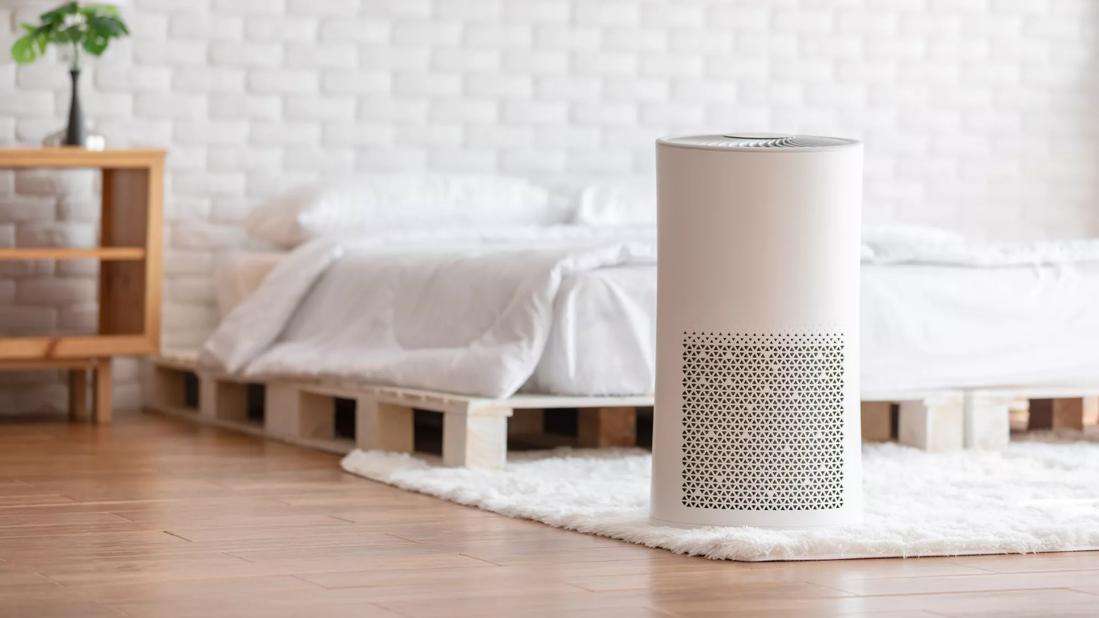Benefits may go beyond breathing

Image content: This image is available to view online.
View image online (https://assets.clevelandclinic.org/transform/64cc3e05-f9f2-4456-880d-3dfc331ffcee/GettyImages-1209792325-scaled_jpg)
Air purifier in cozy white bedroom
There’s nothing like the feeling of being able to breathe easily, especially if you suffer from lung or heart problems. That’s where air purifiers come in. Installing an air purifier in your home or office might help you breathe better, but can it also improve your heart health?
Advertisement
Cleveland Clinic is a non-profit academic medical center. Advertising on our site helps support our mission. We do not endorse non-Cleveland Clinic products or services. Policy
It’s possible, says pulmonologist Rachel Taliercio, DO. Air pollution can either cause or worsen respiratory symptoms such as difficulty breathing, cough and upper airway congestion, but it has also been implicated in heart disease.
“Airborne toxins are irritants,” says Dr. Taliercio. “They have chemical compositions that lead to changes in your blood chemistry, which in turn causes adverse health effects.
For instance, one study found an association between air particulate pollution and carotid artery disease, a condition that can lead to stroke. Another study named pollution as one of the most important risk factors for chronic disease.
“To the extent that you could eliminate some of those particles in the air and reduce the exposure, you’re going to reduce effects on health,” she says.
Many of the potential benefits of using an air purifier are related to your lungs, particularly for conditions such as asthma.
“By filtering out fine particles, purifiers help clean the air you breathe and lessen the potential negative effects of pollution,” says Dr. Taliercio. “Purifiers have been shown to alter the blood chemistry in a way that may benefit heart health, too.”
Several studies have shown improvements in blood pressure and heart rate after the installation of air purifiers. For example, one small-scale study of 35 Chinese college students found that the devices improved air quality, reducing levels of fine particulate matter by 57%. Improvements were reported in both blood pressure levels and lung functions among the students. Another study found that indoor HEPA air filters improved respiratory health in those with asthma.
Advertisement
However, doctors don’t have any long-term data that points to air purifiers reducing strokes, heart attacks or death rates.
“These are all endpoints that look at changes in the blood chemistry that can be monitored, and presumably will have benefits for the heart,” she says. “But such studies have yet to be conducted.”
Since air purifiers can be costly, it’s important to team up with your doctor to weigh in on who is most likely to benefit from them. Air purifier users are most likely to reap health benefits in areas with the greatest air pollution, and that could mean living in a city with poor air quality or near a major source of pollution.
“Benefits may also be higher in young children, elderly and people with heart and/or lung disease,” says Dr. Taliercio.
In particular, these devices may help people who already have diseases that affect the lungs like asthma, cystic fibrosis and conditions of the immune system. If you have difficulty fighting infections, getting an air purifier might be beneficial.
Advertisement

Sign up for our Health Essentials emails for expert guidance on nutrition, fitness, sleep, skin care and more.
Learn more about our editorial process.
Advertisement
The type, quantity and duration of your exposure determines your risk of injury or illness
Best ways to fight indoor air pollution
Your natural estrogen levels support a healthy heart by improving your cholesterol, increasing blood flow and reducing free radicals
Inclusion is at the heart of women’s health
Most recommended precautions center around minimizing bruising or swelling
Even one drink can have an impact on your cognitive function leading to slurred speech, blurred vision and impaired memory
Type 2 diabetes isn’t inevitable with these dietary changes
Applying a hot or cold compress can help with pain
Pump up your iron intake with foods like tuna, tofu and turkey